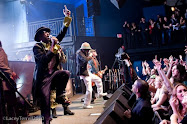 SOMETHING TO KEEP YOUR I OND.C.-based reggae group See-I creates a sound all their own
SOMETHING TO KEEP YOUR I OND.C.-based reggae group See-I creates a sound all their ownWhile many of the music students at the prestigious Laurinburg Institute in North Carolina would have been thrilled by the frequent visits from alumnus and be-bop jazz trumpet pioneer Dizzy Gillespie, not so much for brothers Zeebo and Rootz Steele. The most vivid memory for the front men of D.C.-based reggae band See-I was how their Virgin Islander friends at the school opened their minds to a new world of music. “We both grew up in the country back woods of North Carolina,” said Zee. “But it was the students from the Virgin Islands that would come to our room with stacks of Bob Marley and Peter Tosh records, all of the great reggae artists of the 1970s, and we’d have all-night DJ jam sessions. After I heard [Marley’s] ‘I Shot the Sheriff,’ that was it. I was hooked.” Zee and Rootz Steele have collaborated with world-renowned D.C.-based DJ duo
Thievery Corporation since the late 1980s, when Thievery’s Eric Hilton saw See-I perform at a local D.C. reggae club. Since Hilton opened Eighteenth Street Lounge in Dupont Circle, the brothers have been drawing head-bopping crowds to its Gold Room for their weekly late night reggae fests. It was in the lounge’s famed Green Room—the original smallish studio for ESL Music that now serves as the lounge’s backstage—that See-I and Thievery recorded “.38.45 (A Thievery Number)” in 1996. It was one of Thievery Corporation’s first hits, but Zee didn’t know it at the time. “Eric is very modest,” said Zee. “He didn’t tell me that the song was blowing up. He just said it’s nice. The way he put it, I figured a couple of his buddies DJ’ed it. When we started touring with Thievery we knew that it was far more than just a couple

of people who liked it.” Rootz and Zee continue to tour with Thievery all over the world, playing to crowds reaching tens of thousands. While most of the local reggae bands were Jamaican-bred, Hilton discovered that See-I had a different sound, blending in all types of 1970s funky beats. “They’re great people. They just really love music,” said Hilton. “They were completely immersed in reggae for many years, but their roots are in American classic soul music like Sly & the Family Stone. I think they’re starting to incorporate a lot of those roots into their reggae performances. And when you go see them at the lounge, you go see a reggae soul funk band, which I think is a lot more interesting than seeing a straight up reggae band. They’re unique musically and I think that’s why people gravitate to them so much.” See-I’s band members reflect this diversity in music styles. In addition to the Steele brothers, the group features rhythm guitarist Rob Myers (also with local funk foursome Fort Knox Five), sax player Frank Mitchell, Zee’s son Salem on keyboards and drummer Names Thompson (also with Brazilian bossa nova outfit Soul Brazil). Additional members include Javier Miranda on congas, Brad Clements on trumpet, bassist Steve Sachse, Bobby Thompson on rhythm guitar and vocalist Candice Mills. “Our influences are so spread out, totally international,” says Rootz, who like his brother sports large dreadlocks. ”It’s not like we’re a set format or genre, even if we sort of look like we’re reggae, which we are, but everybody in this group has an influence and everyone is appreciated.” See-I’s reggae is tinged with various other genres, ranging from very mellow down tempo (“Me

an Joe Green”), to faster paced dub beat with hints of electronica (“The King”), to heavy percussion-based (“Bulletproof”). But their most beloved track, and the one they usually close out shows with, is “Homegrown”—the band’s ode to their adoptive hometown D.C., its soulful chorus taking listeners on a journey through the city’s streets. “18 Street across Florida too / ‘gwan U Street to Georgia Avenue/Northeast, Southwest, Southeast crew/D.C., M Street, that’s how we do.” “It’s reminiscent of where we’re at, who we are,” said Zee. “In D.C., we don’t have that big of a music scene. We do, it’s just more of an underground scene. That song gets people hyped up, because it’s not a political song, it’s a chant of the street, the vibe of the street. We have always tried to have our own D.C. slice of the pie, getting our own [music] fingerprint. It’s kind of what we feel is D.C. style. It’s homegrown.” For more information on See-I, visit
www.myspace.com/seei
 PHOTO STORY
PHOTO STORY






































